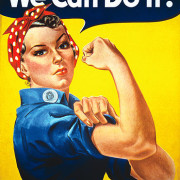A Look at Today’s “Lost Generation” – Are We Repeating History?
Last week, I completed the 10 part series of why Millennials should strongly consider being entrepreneurs sometime during their career. I strongly believe those who lead this movement are going to be the leaders of not only their own businesses, but the next generation as a whole.
In part 6 of the series, I touched briefly on how many believe that Millennials are the today’s Lost Generation. However, I didn’t spend much time actually defining what the means.
We’ve seen the problem we have today before. In fact, the last generation which was actually referred to the Lost Generation was the generation that came of age during World War 1. In a story involving Ernest Hemingway and Gertrude Stein, a garage owner referring to a young mechanic called those who had been through the war as une génération perdue – translating as “a lost generation”. Furthermore he added, “That is what you are. That’s what you all are… all of you young people who served in the war. You are a lost generation.”
Looking back we can understand why he might have said this. The events surrounding the war led to young people realizing that life was going to be rough for them. This belief was backed by many promising young lives being lost as casualties in the war itself. So, of course those who survived are going to be potentially depressed and not care as much about their career and place in life. Obviously, there was probably a lot of undiagnosed PTSD going around.
Furthermore, the world that they learned about from their parents didn’t exist anymore. So naturally they questioned the principles of their parents’ generation. Combine this all together and you get a lack of certainty, direction, and purpose. This led many to search for deeper meanings and truths. Finally leading many American artists and writers to Europe as “wanderers of culture”. Hemingway and Stein were a part of this group.
It sounds to me that the phrase “Lost Generation” was more of truthful description back then. While the comment the shop owner said was probably meant to be an insult, it actually had a lot of truthfulness to it.
The Past Can Help Predict the Future:
In Strauss and Howe’s Generational Theory, there is a noticeable cycle of eras spanning roughly 20 years called turnings. These turnings are caused by generational events which define the turning’s mood.
According to many out there (especially this subreddit on reddit.com), there are a lot of similarities of the Millennials to the Lost Generation. We’ve both had a war to fight which wasn’t really ours to fight. (Both, many would say, were started for questionable reasons as well.) We’ve both also had to come to terms with a world we weren’t programmed since birth for. The list goes on. To many out there, it’s not a great time to live in.
Young adults everywhere are questioning the whole “Get good grades, go to college, and get a good job to support a happy family” plan. And it makes perfect sense in why they’re doing that. For one, the jobs aren’t there which you need a degree for. And frankly, the end result didn’t really happen for our parents half the time. So why follow their plan if we see it not working?
So yeah, Millennials could be seen as the New Lost Generation. Sure. There’s definitely a case for that.
However, if you really look at the Generational Theory, you’d see that Strauss and Howe believe that Generation X was the most recent Nomad Generation (which is what the Lost Generation was) – not the Millennials. In that same vein of the thought, the GI Generation (aka the Greatest Generation) were those that came after the Lost Generation and took the world by the horns. This group is who they compare Millennials to. People remember them. Generally we don’t remember the Lost Generation.
Interesting, huh?
Going from Good to Great
So, the summary is this. We are kind of a mixed generation. There are those of us who are caught up in the “I’m a victim of the times I live in” mentality. Those that are Lost. And then there’s those of us who want to be Great. We realize the world could be better, yes, and we’re driven to make it that way again.
So the question is… which one are you? If you consider yourself part of the Great, what are you going to do to make this world better then how you found it? Below let’s talk about what you’re doing and how you’re paying it forward.


